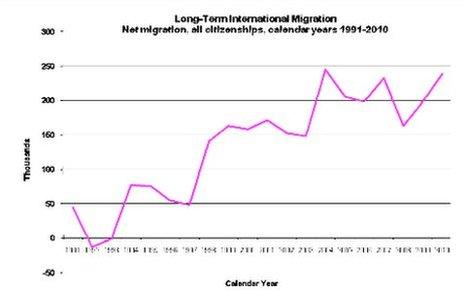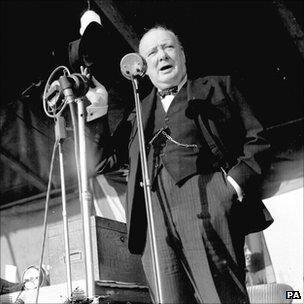Statistics and the art of political persuasion
- Published
- comments

Ministers like statistics which show the other lot in a bad light and themselves basking in glory.
But often the numbers have an irritating habit of not adding up that way.
On Friday, the Immigration Minister Damian Green received a letter from the official statistics watchdog, external following a speech in which he claimed that "after years of net migration increasing relentlessly, the figures stabilised in the last quarter of 2010".
The subtext was obvious: when Labour was in power, migration was out of control. As soon as we took over, things started to improve.
The Chair of the UK Statistics Authority (UKSA), Sir Michael Scholar, wrote to say that he saw the trend rather differently.
"Our own analysis suggests that whilst there was undoubtedly a marked increase in net migration between 1991 and 2004, the evidence is mixed as to any further increase since then."
This is the graph to which Sir Michael is referring, information published by the ONS in August this year.

It is, as Sir Michael makes clear, a "volatile" series of data, but for a politician trying to make a partisan point about immigration policy it is pretty unhelpful.
My reading of the graph is that there have been periods of increase and stabilisation in net migration across 20 years in which Britain has been governed by Conservative, Labour and coalition governments.
The trend has been broadly upwards but, as the UKSA puts it, we now seem to be in "a period in which the figures have varied around 200,000 a year".
Figures for net migration are notoriously difficult to pin down because measuring both inflow and outflow are based on inexact data which means there is far greater room for interpretation, of course.

The UKSA was prompted to investigate Mr Green's analysis of the official statistics by Matt Cavanagh of the left-leaning think tank Institute for Public Policy Research (IPPR). As a former No 10 staffer, Mr Cavanagh has a bit of form himself when it comes to the misleading statistics (remember this blog on knife crime?).
The original speech and the subsequent letter, then, must be seen partly in terms of political point scoring. As the UKSA say to Mr Cavanagh in a separate note, "the liberal selection and interpretation of statistics in speeches and political statements is something we have to accept".
The official does not think Mr Green's comments were substantially misleading but does describe the claim that net migration rose relentlessly until 2010 as "problematic".
"In this particular case," he writes, "we have concluded that whilst we would describe the trend in net migration rather differently from the Minister, there is room for different interpretations."
Not a hanging offence, then, but the affair is a reminder of how numbers can be used to shape a questionable political narrative, and how the existence of the UKSA means Ministers must now think twice before doing what once came naturally.
As Winston Churchill told a Parliamentary aide: "When I call for statistics about the rate of infant mortality, what I want is proof that fewer babies died when I was prime minister than when anyone else was prime minister. That is a political statistic."